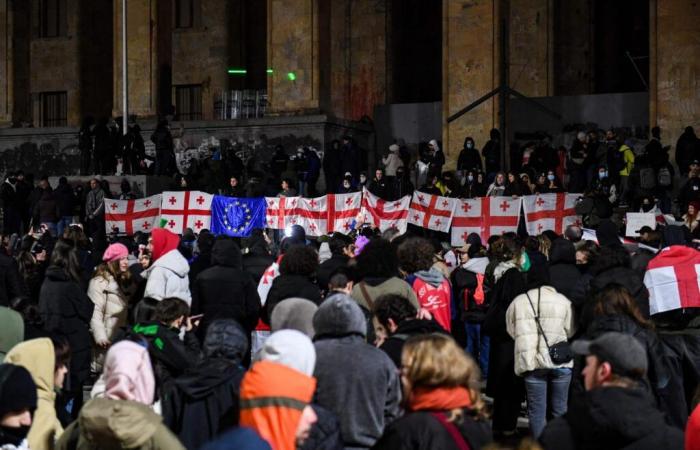Dor more than a week, Georgia has been in turmoil, the scene of daily demonstrations triggered by the government’s decision, on November 28, to suspend the former Soviet republic’s accession process to the European Union (EU).
This protest movement, which spread from Tbilisi, the capital, to several cities across the country, was violently repressed. Journalists are deliberately targeted by the police, hundreds of demonstrators have been arrested, opposition leaders arrested and brutalized. Prime Minister Irakli Kobakhidze promised to “do everything necessary to completely eradicate liberal-fascism” of the opposition. As during the Ukrainian Maidan revolution in 2014, the message from the Georgian protesters is clear: they accuse the government of wanting to keep their country in the Russian orbit, refuse this trajectory and ask to continue rapprochement with the EU.
Supported by the pro-European president of Georgia, Salomé Zourabichvili, they also demand new elections and reject the results of the October 26 vote, marred by irregularities noted by numerous foreign observers, and including the Georgian Dream party, in power since twelve years old, emerged victorious. The president, whose term ends this month, has pledged to stay in her post because she challenges the legitimacy of the Parliament that came out of the polls to elect her successor.
Read the interview | Article reserved for our subscribers Salomé Zourabichvili, President of Georgia: “This is a vital moment for the country, the outcome of which I hope will not be tragic”
Read later
Embarrassed, most EU countries have so far limited themselves to condemning the violence and asking the Georgian government to get back on the European path. Some are considering following the Balts, who have announced sanctions against those responsible for the repression. They hesitated to come out in favor of new elections, considering that, despite the irregularities, Georgian Dream was undoubtedly in a dominant position.
This lack of firmness obviously plays into the hands of the Kremlin, which does not hide its desire to keep the post-Soviet space under its control. Westerners, Russian Foreign Minister Sergei Lavrov warned Thursday, December 5 in Malta, must “understand that [Moscou serait] ready to use all means to prevent them from achieving what they call the “strategic defeat of Russia”.”
The warning mainly concerns Ukraine, but there is no doubt that Russia is behind the manipulations that marked the last elections in Moldova, Georgia and most recently in Romania.
Never, probably, has an election organized in the EU been as doubtful as the first round of the Romanian presidential vote, on November 24, which saw a pro-Russian candidate out of nowhere, Calin Georgescu, obtain almost 23% of the votes. voice after campaigning almost exclusively on TikTok. The Romanian security services confirmed on Wednesday what many media had detected: this sudden popularity on this very popular social network in Romania is the result of a manipulation operation which cost several hundred thousand euros, and including “the modus operandi and the scale” evoke an unnamed state actor, which can only be Russia.
Read also | Article reserved for our subscribers Presidential election in Romania: declassified documents suggest serious manipulation on TikTok
Read later
We must no longer hide our faces: Vladimir Putin’s regime is waging its hybrid war even within the EU. Not reacting firmly in Georgia under the pretext that the situation lacks clarity can only encourage it to continue, there and elsewhere.






